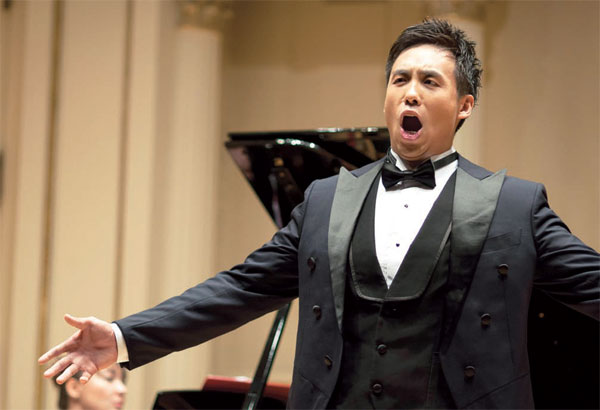Chinese baritone brings music to life
Several well-known Chinese art songs thundered through Carnegie Hall recently, thanks to Chinese bass-baritone Hong Zhiguang.
His Sept 23 recital combined classical Western lieder and modern Chinese compositions.
Hong's rendition of Schumann's 15-song cycle Dichterliebe showed his wide expressive range, from hushed and lovelorn to loud, comic and folksy.
His rich and resonant voice handily carried both the dramatic and musical weight of Poulenc's Chansons Gailardes.
|
Hong Zhiguang, a bass-baritone from China who graduated from the Yale School of Music in 2016, sings the Chinese art song My Motherland during his recital at Carnegie Hall on Sept 23. Photos by Zhang Ruinan / China Daily |
Most impressive were the Chinese songs that ended the program, including Zhu Qing's The Great River Flows to the East, Sinn Sing Hoi's Ode to the Yellow River and Zaiyi Lu's nostalgic My Motherland, in which Hong showed more variety and depth of feeling than in the prior songs.
"I specially chose four Chinese art songs for this recital because I want more audiences in the US to know and understand about Chinese culture and arts through my voice and performance," said Hong.
Growing up in a musical family in Beijing, Hong has been interested in music, especially opera, since he was a child.
"My parents used to take me to many concerts and musicals when I was very young," said Hong. "When I first listened to my father's vinyl opera records, I was shocked by the way they sang and the beauty and the richness of their voices."
Though he started to learn opera at the age of 17, when he won a Beijing high school vocal competition, he came to realize that his voice was well suited for opera.
After graduating from high school, he earned a bachelor of music degree from the China Conservatory of Music. After graduating, he went to Mannes at The New School of Music for a master of music degree in New York in 2014 and an artist diploma from Yale School of Music last year.
As an international student, Hong was confronted with many challenges when he started to learn opera performance in the US.
"We are not only studying singing and performing, but we have to understand the languages - many operas are written in German, French and Italian, and also the stories behind them," said Hong. "So I have to invest more time and effort than students from the US and European countries to learn the languages as well as the cultures."
Hong's efforts paid off. He received full scholarships from both Mannes and Yale and in 2016, he was named the Metropolitan Opera National Council Boston's District winner and was honored with the first prize at the First International Opera Competition in Hong Kong.
He was the baritone soloist in Beethoven's 9th Symphony with the Washington Ark Foundation at Strathmore Music Center and recently sang the role of Escamillo in Carmen.
"We met three years ago in Virginia at the International Vocal Arts Institution, and I was his coach," said Alexandra Naumenko, a vocal coach on the faculty of the University of Miami's Frost School of Music, who accompanied Hong on the piano for the recital. "He immediately caught my attention by his incredible instrument and his talent - he has a world-class voice."
"It was an excellent recital," said Ricky Nan, an opera student at Yale. "Zhiguang's voice is tremendous, thunderous and huge; it comes with great power."
"Instead of singing the music, he is like being the music, being the character," added Nan. "He is such a great storyteller."

























